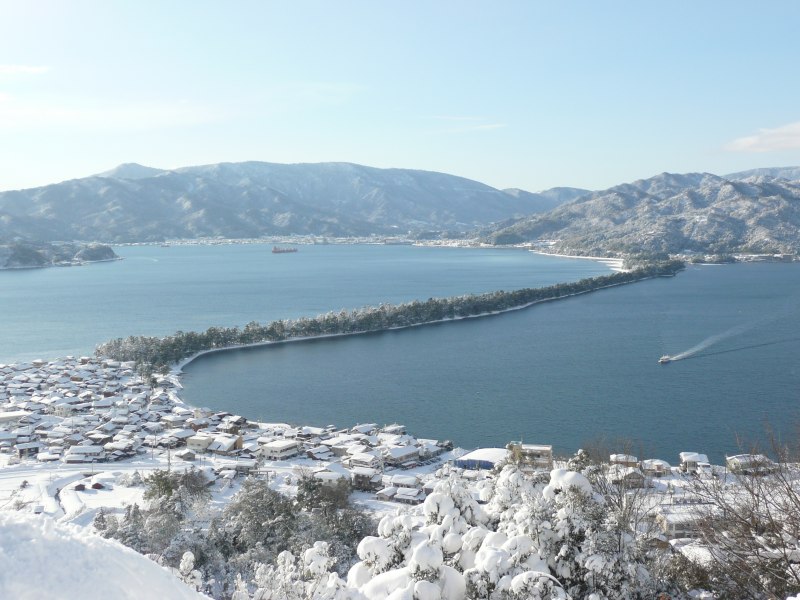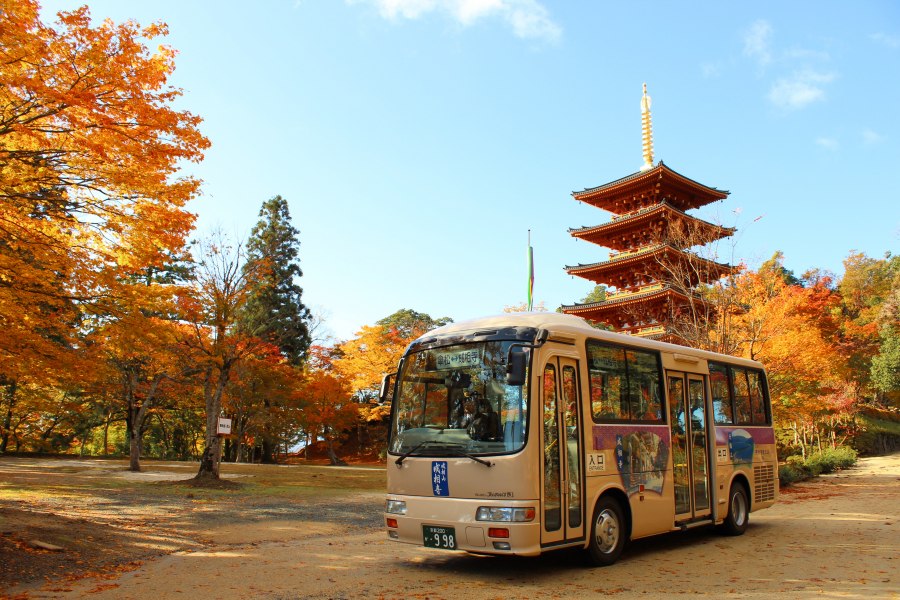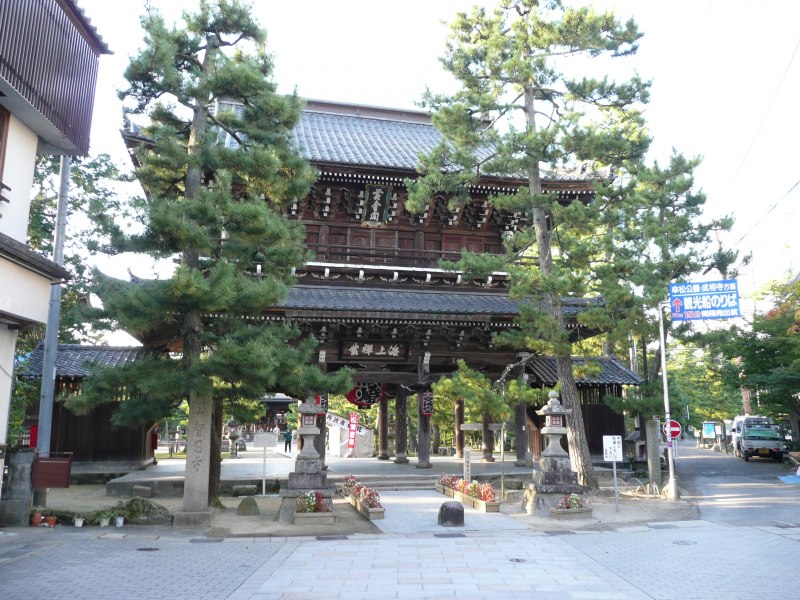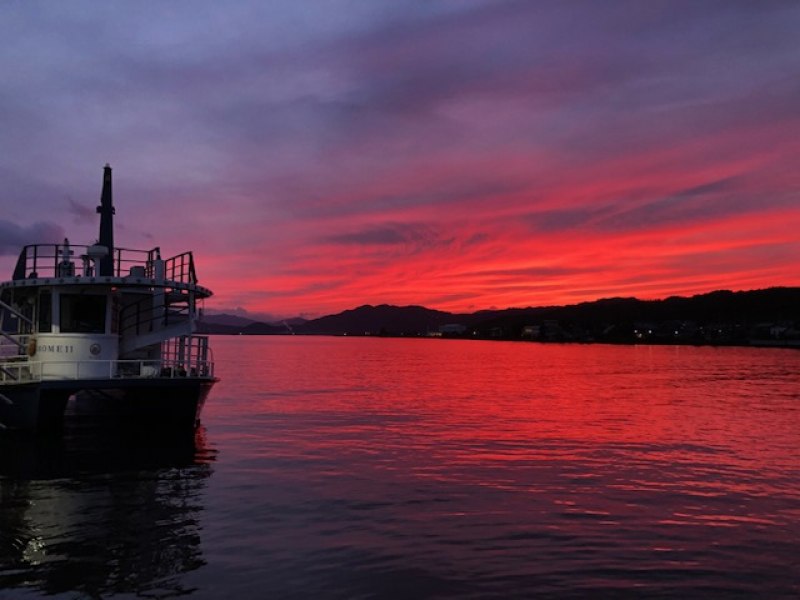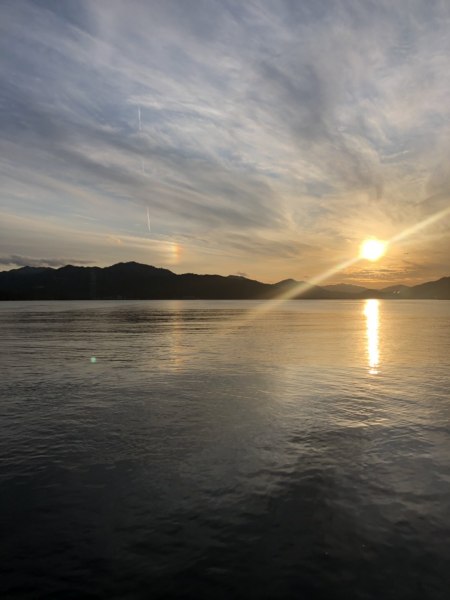Amanohashidate Sightseeing Boat (Amanohashidate - Ichinomiya)
|
Routes (Round-Trip) |
||
|
From
Amanohashidate Boat Dock
|
 Ports of Call
Ports of Call

|
To
Ichinomiya Boat Dock
|
|
Fare [JPY]
800 - 800
|
||
|
Distance and Course Time
3.5km - 3.5km
/ 12M - 12M |
||
|
<Overview> Regularly operated 12-minute sightseeing boat around Aso Bay with a view of Amanohashidate, one of Japan's three scenic views. [Miyazu – Amanohashidate – Ichinomiya] route operates one roundtrip per day. *Additional trips available during busy seasons such as Golden Week <Details> The boat that runs between Miyazu, Amanohashidate and Ichinomiya is a convenient sea transportation for visiting Amanohashidate. It connects Fuchu and Monju districts, the two banks connected by a sand spit covered with pine trees, in just 12 minutes. It runs along Amanohashidate, allowing the passengers to take in its full view. Miyazu Bay, where Amanohashidate Sightseeing Boat operates, is a sister bay of Mont Saint Michel in France. Together with Ine Bay, it is a member of the “Club of the Most Beautiful Bays of the World.” Its natural beauty and wealth of ecosystems is recognized globally. Feel the lovely sea breeze on the deck. Hand feed the charming seagulls, your traveling companion (*Gull feed is sold on board). Boat is equipped with air conditioning and toilets. <Nearby Tourist Attractions> ■Amanohashidate 7 minutes on foot from Kyoto Tango Railway Amanohashidate Station Amanohashidate, along with Mutsu’s Matsushima and Aki’s Miyajima, is one of Japan’s three most celebrated scenic spots. It is a sand spit about 20 to 170 m wide and about 3.6 km in length, covered with about 8,000 pine trees. The unusual terrain has come to be called Amanohashidate because its shape looks like a bridge over the heavens. It has been designated as Tango-Amanohashidate-Ōeyama Quasi-National Park. The view from the Kasamatsu Park observatory called “shoryukan” (rising dragon) and the view from the Monju observatory called “hiryukan (flying dragon)” are both beautiful and auspicious sights. Other available activities include a stroll through the pine trees in Amanohashidate, cycling, and swimming in the beach. Crossing Amanohashidate takes about 50 minutes one way on foot and about 20 minutes by bicycle. (Rental bicycles available at Amanohashidate Boat Dock and Ichinomiya Boat Dock) ■Tenkyozan Chion-ji Temple 7 minutes on foot from Kyoto Tango Railway Amanohashidate Station Located next to Amanohashidate Boat Dock, where Amanohashidate Sightseeing Boat departs. The temple was founded in 808CE at the request of Emperor Heizei. It enshrines Monju (Manjushri), the bodhisattva that gives wisdom, and worshippers come from all over the country to pray for academic success. The monju is well-known in the proverb “sannin yoreba monju no chie” (Two heads are better than one). Chion-ji Temple’s monju, called Kireto’s Monju, is counted as one of Japan’s three grand monju along with Kameoka Monju and Abe Monju. It is a highly regarded temple that was visited by Shogun Ashikaga Yoshimitsu during the Muromachi period. It holds a large collection of valuable cultural treasures such as buildings, sculptures, and ema (*Ema is usually a small wooden plaque on which prayers are written, but those designated as cultural properties are very large and are hung on the inner wall of the temple.). Monjudo Ebisu Festival is held every year on January 10. ■ Rotating Bridge 7 minutes on foot from Kyoto Tango Railway Amanohashidate Station Located next to Amanohashidate Boat Dock, where Amanohashidate Sightseeing Boat departs. The bridge connects Amanohashidate to the land where Monjudo is located. It turns 90 degrees when a ship passes. A manual rotating bridge was built in 1923, and with the increase in the number of passing large vessels, it was changed to an electric one in May 1960. On a busy day it rotates about 50 times a day. A great spot for photos and videos! ■Amanohashidate Shrine The only shrine in Amanohashidate. There is a stone torii gate on the Aso Sea coast. ■Amanohashidate Isoshimizu Isoshimizu is a mysterious well located at Amanohashidate Shine, where fresh water springs up despite being surrounded by the ocean. It is designated as one of Japan’s 100 Best Waters. Currently, it is not allowed to drink the water. During the Heian period, Izumi Shikibu wrote a poem praising the water of Isoshimizu. ■ Motoise Kono Shrine 4 minutes by foot from Ichinomiya Boat Dock on the Amanohashidate Sightseeing Boat When you get off at Ichinomiya Boat Dock, you will see the Tango Ichinomiya Moto Ise Kono Shrine in front of you. A historical shrine that was approached from Amanohashidate. Its name “Motoise” (former Ise) is said to come from Amaterasu-ōmikami and Toyouke-ōmikami having being enshrined here before they were enshrined at Ise Grand Shrine in Mie Prefecture. Goshiki-no-Suetama, placed on the railing, is only allowed at Ise Grand Shrine and Kono Shrine. Manai Shrine is the inner shrine of Motoise Kono Shrine, where deities such as Toyouke-ōmikami and Amaterasu-ōmikami are enshrined. It is considered a power spot along with Kono shrine. ■ Amanohashidate Kasamatsu Park Near Kono Shrine and about a 7-minute walk from Ichinomiya Boat Dock, there is a cable car / lift platform to Kasamatsu Park. The cable car arrives at Kasamatsu Park in about 4 minutes. Kasamatsu Park is famous for upside down viewing of Amanohashidate through your legs, which is referred to as "Matanozoki." When viewed upside down, Amanohashidate looks like a floating bridge over the heavens. Take the lift down, which runs parallel to the cable car, and get the best view looking down on Amanohashidate. It is also possible to take the lift up and cable car down. Seasonal sceneries can be enjoyed on the ride, such as cherry blossoms, hydrangeas, and autumn leaves. The view of Amanohashidate from Kasamatsu Park is called “shoryukan” (rising dragon). In Japan the image of a dragon rising to the heavens signifies success in life, business, etc. and is a very auspicious scene. Restaurant Ama Terrace and a souvenir shop are available on site. ■ Nariai-ji Temple, 28th temple of the Saigoku Kannon Pilgrimage Take Tankai Tozan Bus from Amanohashidate Kasamatsu Park for about 7 minutes. The temple has a rich history and tradition including lores and ghost stories. With rhododendron in spring and colorful leaves in autumn, it is a power spot surrounded with beautiful nature. It is the 28th site of the pilgrimage to the 33 Buddhist temples in Western Japan, and was founded in 704CE at the request of Emperor Monmu. It enshrines Kannon Bodhisattva and is known as a temple that makes wishes come true. The Heisei five-storied pagoda has been restored to its original form of the Kamakura Period (completed in 1998). It is especially beautiful when adorned with colorful leaves in autumn. <Access to the Boat Docks> ■Amanohashidate Boat Dock 466 Monju, Miyazu-shi, Kyoto About 7 minutes on foot from Amanohashidate Station (Kyoto Tango Railway) ■Ichinomiya Boat Dock 118-1 Ogaki, Miyazu-shi, Kyoto About 7 minutes on foot from Amanohashidate Station (Kyoto Tango Railway) to Amanohashidate Boat Dock, about 12 minutes from Amanohashidate Boat Dock 1 minute walk from Amanohashidate Motoise Kono Shrine Bus Stop (Tango Kairiku Kotsu Route Bus) <Operator> Tango Kairiku Kotsu Co., Ltd. |
||
| Items of Interest | Coastal Scenic Cruises | Route Type | Passenger Ships |
|---|---|---|---|
| Reservation | Yes | Credit Card | Yes |
| Contact Information |
Tango Kairiku Kotsu Co., Ltd. TEL: 0772-42-0323 ( Japanese Only ) 8:45am - 5:45pm |
||
| Details | |||
Ports of Call
Click the port of call and it will appear on the map






